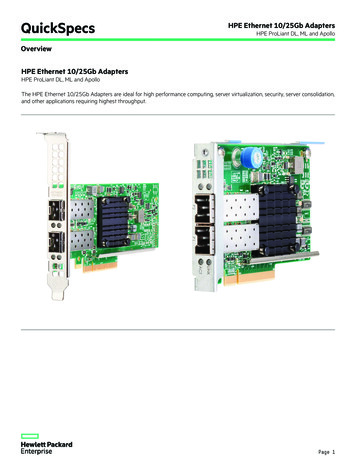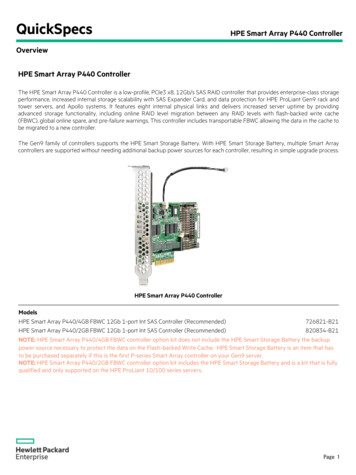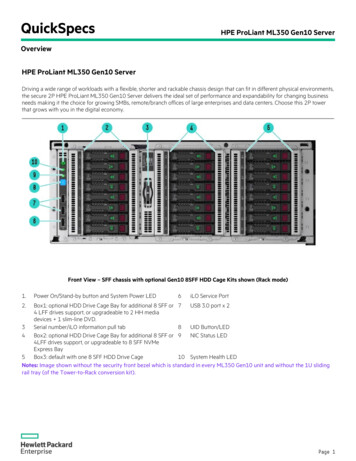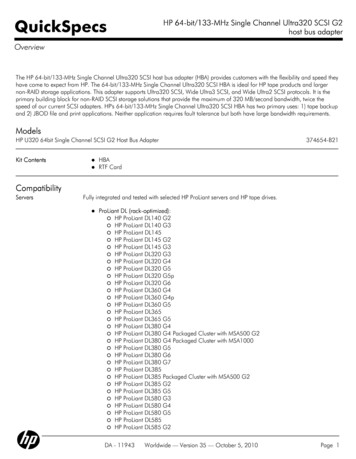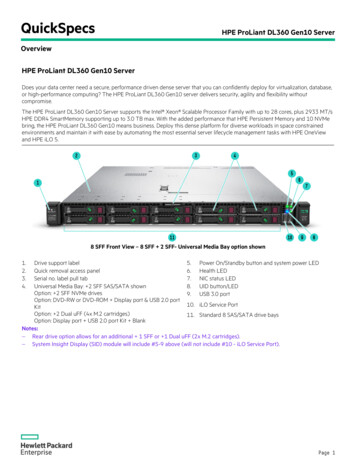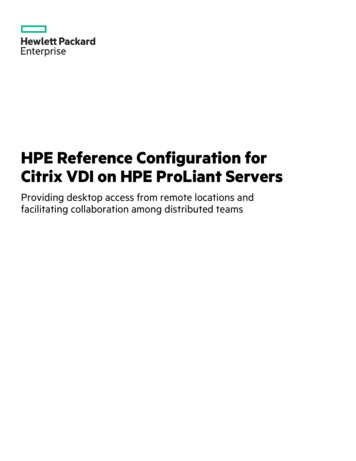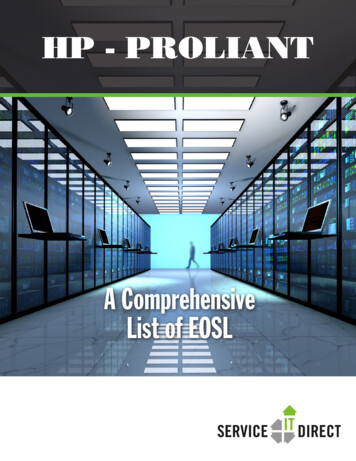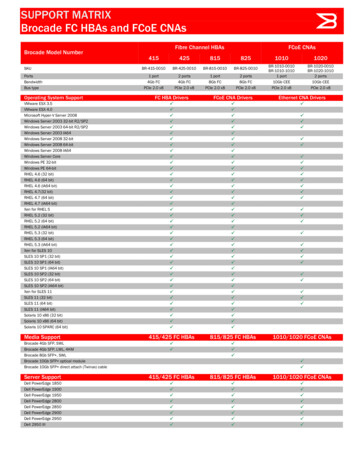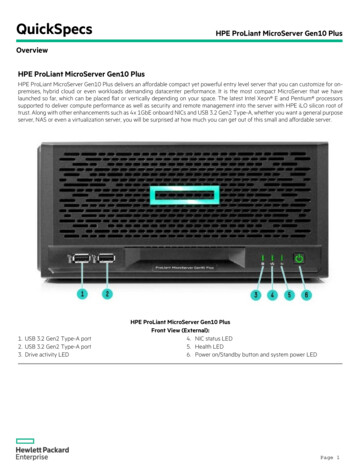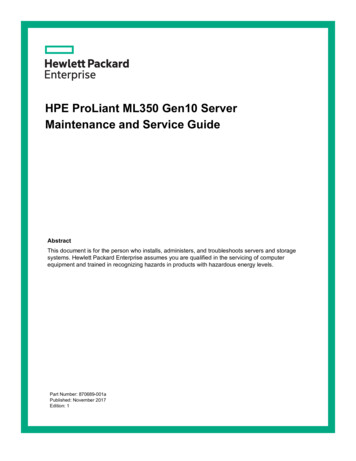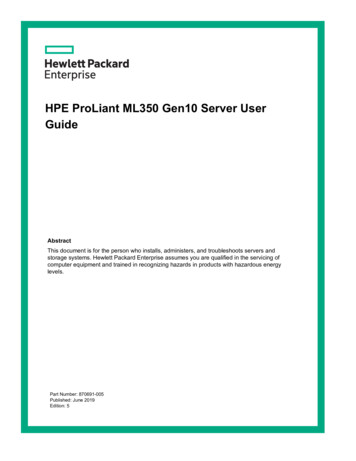
Transcription
HPE ProLiant ML350 Gen10 Server UserGuideAbstractThis document is for the person who installs, administers, and troubleshoots servers andstorage systems. Hewlett Packard Enterprise assumes you are qualified in the servicing ofcomputer equipment and trained in recognizing hazards in products with hazardous energylevels.Part Number: 870691-005Published: June 2019Edition: 5
Copyright 2017–2019 Hewlett Packard Enterprise Development LPNoticesThe information contained herein is subject to change without notice. The only warranties for HewlettPackard Enterprise products and services are set forth in the express warranty statements accompanyingsuch products and services. Nothing herein should be construed as constituting an additional warranty.Hewlett Packard Enterprise shall not be liable for technical or editorial errors or omissions containedherein.Confidential computer software. Valid license from Hewlett Packard Enterprise required for possession,use, or copying. Consistent with FAR 12.211 and 12.212, Commercial Computer Software, ComputerSoftware Documentation, and Technical Data for Commercial Items are licensed to the U.S. Governmentunder vendor's standard commercial license.Links to third-party websites take you outside the Hewlett Packard Enterprise website. Hewlett PackardEnterprise has no control over and is not responsible for information outside the Hewlett PackardEnterprise website.AcknowledgmentsmicroSD is a trademark or a registered trademark of SD-3D in the United States, other countries of both.Microsoft , Windows , and Windows Server are either registered trademarks or trademarks of MicrosoftCorporation in the United States and/or other countries.Linux is the registered trademark of Linus Torvalds in the U.S. and other countries.Red Hat Enterprise Linux is a registered trademark of Red Hat, Inc. in the United States and othercountries.VMware ESXi and VMware vSphere are registered trademarks or trademarks of VMware, Inc. in theUnited States and/or other jurisdictions.
ContentsComponent identification.8Front panel components. 8Serial number/iLO information pull tab.9Front panel LEDs and buttons. 9Server UID LED.10UID button functionality. 11Front panel LED power fault codes. 11Rear panel components.12Rear panel LEDs.14System board components. 15System maintenance switch descriptions. 17DIMM label identification. 18PCIe slot description. 19Processor, heatsink, and socket components.20Drive LEDs and buttons. 21Low profile LFF drive LED definitions. 21Hot-plug drive LED definitions.22NVMe SSD LED definitions.23NVMe SSD button actions. 24Drive bay numbering.25SFF drive bay numbering: Smart Array controller. 26SFF drive bay numbering: SAS expander .27NVMe drive bay numbering.28LFF drive bay numbering: Smart Array controller. 29Fan bay numbering. 29Media device screws.30Expansion board screws.30Operations. 32Power up the server.32Powering down the server. 32Unlock the front bezel. 32Open the front bezel. 33Remove the front bezel.33Install the front bezel.34Store the front bezel keys. 34Position the tower server for hardware configuration.35Position the tower server for operation. 36Extend the server from the rack.37Remove the server from the rack.39Slide the server into the rack. 41Remove the access panel.42Install the access panel.43Remove the air baffle. 44Install the air baffle. 45Remove the fan cage.46Install the fan cage.47Remove the half-height media bay blank.48Remove the PCI blank retainer.483
Remove the PCI slot blank. 49Remove a PCI board screw. 50Install the PCI blank retainer.50Open the CMA cable clamps . 51Install the shipping hardware. 52Setup. 56Optional service. 56Initial server installation.56HPE Installation Service.56Setting up the server. 57Operational requirements. 60Space and airflow requirements.60Temperature requirements. 61Power requirements. 61Electrical grounding requirements.62Server warnings and cautions.62Rack warnings and cautions. 63Electrostatic discharge.64Setting up the server in tower mode. 64Removing the shipping brackets.65POST screen options.66Installing or deploying an operating system.66Hardware options installation.67Introduction. 67Drive options. 67Drive guidelines.67Drive support information. 67Installing an LFF non-hot-plug drive.68Installing an LFF hot-plug drive.70Installing an SFF hot-plug drive. 71Installing an NVMe SSD.72Power supply options.74Hot-plug power supply calculations.74Power supply warnings and cautions.74Install an AC power supply.74Install a DC power supply. 76Tower-to-rack conversion kit. 82Installing the tower-to-rack conversion kit . 83Prepare the server for rack installation. 83Install the rack rails and server tray. 84Install the server into the rack. 87Install the cable management arm. 89Drive cage options. 924 LFF non-hot-plug drive cage option. 924 LFF hot-plug drive cage option. 958 SFF hot-plug drive cage option. 998 NVMe SSD Express Bay enablement option. 102Media device options. 105Installing a SAS LTO tape drive. 105Installing a USB RDX drive.110Optical drive cage option. 112Fan cage option.1154
Fan cage implementation. 115Fan population and hot-plug support.116Fan mode behavior.116Fan speed.117Installing the fan cage.117Memory options.121DIMM population information. 121DIMM-processor compatibility.121HPE SmartMemory speed information.121Installing a DIMM.121Processor heatsink assembly option. 123Installing the processor heatsink assembly.123Processor cautions.123Install the processor heatsink assembly. 123Storage controller options. 126Standup PCIe plug-in Smart Array controller option (type-p).126Modular Smart Array controller option (type-a, AROC).129Configuring an HPE Smart Array Gen10 controller.132Energy pack options. 133HPE Smart Storage Battery. 133HPE Smart Storage Hybrid Capacitor.133Installing an energy pack. 134Expansion board options. 136Expansion board thermal requirement. 137GPU installation requirements. 137Installing an expansion board. 137HPE 12G SAS expander card option.140SAS expander card port numbering.141Installing the SAS expander card.141M.2 SSD enablement option. 144Installing an M.2 SATA SSD.144Redundant power supply enablement option.147Installing the redundant power supply enablement option. 147Internal USB device options.152Installing an internal USB device. 153HPE Trusted Platform Module 2.0 Gen10 option.154Overview. 154HPE Trusted Platform Module 2.0 Guidelines.154Installing and enabling the HPE TPM 2.0 Gen10 Kit. 155Cabling. 160Cabling guidelines.160Internal cabling management.161Storage cabling. 162Storage controller cables. 162LFF non-hot-plug drive onboard SATA port cabling . 163LFF hot-plug drive controller cabling.164SFF hot-plug drive controller cabling. 167NVMe SSD data cabling. 171M.2 SATA SSD cabling.171Drive power cabling.172Energy pack cabling.172Storage controller backup power cabling.173Media device cabling. 173SAS LTO tape drive cabling. 1745
USB RDX drive cabling. 175SATA optical drive cabling.176GPU auxiliary power cabling.176Standard power supply cabling (non-hot-plug). 177Front I/O module cabling.177Software and configuration utilities. 178Server mode.178Product QuickSpecs. 178Active Health System Viewer. 178Active Health System. 179HPE iLO 5. 180iLO Federation. 180iLO Service Port. 180iLO RESTful API.181RESTful Interface Tool. 181iLO Amplifier Pack.181Integrated Management Log.182Intelligent Provisioning. 182Intelligent Provisioning operation. 182Management Security. 183Scripting Toolkit for Windows and Linux. 183UEFI System Utilities. 184Selecting the boot mode . 184Secure Boot. 185Launching the Embedded UEFI Shell . 185HPE Smart Storage Administrator. 186HPE MR Storage Administrator. 187HPE InfoSight for servers . 187StorCLI.187USB support.188External USB functionality.188Redundant ROM support. 188Safety and security benefits. 188Keeping the system current. 188Updating firmware or system ROM. 188Drivers.191Software and firmware. 191Operating system version support. 191HPE Pointnext Portfolio.191Proactive notifications. 192Troubleshooting. 193NMI functionality.193Troubleshooting resources.193System battery replacement. 194System battery information. 194Removing and replacing the system battery.194Replace the system battery.195Safety, warranty, and regulatory information. 1966
Regulatory information.196Notices for Eurasian Economic Union.196Turkey RoHS material content declaration.197Ukraine RoHS material content declaration. 197Warranty information.197Specifications.198Environmental specifications. 198Mechanical specifications. 198Power supply specifications.199HPE 500W Low Halogen Non-hot-plug Power Supply. 199HPE 500W Flex Slot Platinum Hot-plug Low Halogen Power Supply.200HPE 800W Flex Slot Platinum Hot-plug Low Halogen Power Supply.201HPE 800W Flex Slot Titanium Hot-plug Low Halogen Power Supply. 202HPE 800W Flex Slot Universal Hot-plug Low Halogen Power Supply.203HPE 800W Flex Slot -48VDC Hot-plug Low Halogen Power Supply. 203HPE 1600W Flex Slot Platinum Hot-plug Low Halogen Power Supply.205Websites. 206Support and other resources.207Accessing Hewlett Packard Enterprise Support. 207ClearCARE technical support. 207Accessing updates.207Customer self repair.208Remote support. 208Documentation feedback.
4 Half-height media bay 1 (for SAS LTO tape drive option or USB RDX drive option)2 5 Half-height media bay 2 (for USB RDX drive option)2 6 Optical drive bay (for slim-type SATA optical drive option)2 7 Serial number/iLO information pull tab on page 9 Table Continued 8 Component identification
